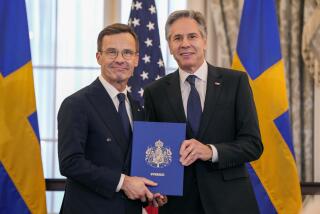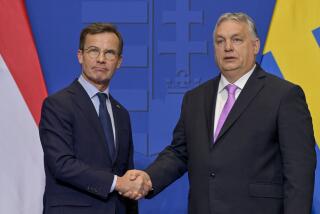Swedish-Soviet Ties Strained : Chernobyl Disaster Could Undermine Stockholm Policy
- Share via
STOCKHOLM — Swedish anger over the Chernobyl nuclear disaster threatens to undermine the Swedish government’s careful campaign over the last two years to improve relations with the Soviet Union.
That campaign reached a high point in mid-April when Prime Minister Ingvar Carlsson paid an official visit to the Soviet Union and met for more than three hours with Soviet leader Mikhail S. Gorbachev.
Since the detection of the accident by Swedish technicians early this week, many officials have complained, often angrily, about the Soviet government’s failure to give Sweden and other governments warning of the radioactive clouds heading their way.
“It’s too early to tell,” said Allan M. Din, a Dane who follows nuclear affairs for the Stockholm International Peace Research Institute, “whether these words were just something that had to be said or whether they signaled a return to the cold war.”
The issue plays against an odd geographical and historical background.
Presence Not Felt
Stockholm lies just across the Baltic Sea from Leningrad, yet--except at rare times like now--Swedes do not seem to feel the presence of the Soviet Union in their consciousness.
For centuries, Russia was the traditional enemy of Sweden, a powerful rival that shredded the Swedish empire and reduced it by the 19th Century to a second-rate power.
Yet, from the Bolshevik Revolution of 1917 until a Soviet submarine ran aground on Swedish soil in 1981, Sweden, proud of its neutrality, maintained good relations with the Soviet Union.
The Swedish campaign for a revival of these relations received another, though somewhat tangential blow Friday when the Swedish Foreign Ministry announced the expulsion of four Czech diplomats and the manager of CSA, the Czech airline, for “activity incompatible with their official assignment in this country.”
The Swedish newspaper Expressen said that Swedish police caught them in espionage on industries producing arms and high technology.
Offensive activity by a Soviet satellite government would surely not make the Swedes feel any better about the Soviet Union.
Strong, Not Bitter
The official Swedish rhetoric against the Soviet Union has been strong though not bitter this week.
Minister of Energy Birgitta Dahl has been the most outspoken official in her disdain for the Soviet delay in announcing the accident.
Though complaining forcefully about the delay, Prime Minister Carlsson has been ambiguous enough to be quoted by one Stockholm newspaper as stating that the incident would not worsen relations with the Soviet Union while being quoted in a second Stockholm newspaper as insisting that it would.
At his office in the Stockholm International Peace Research Institute, Din said he believes that the official rhetoric was designed mainly for home consumption.
With its criticism, Din went on, the Social Democratic government of Carlsson was trying “to distance itself from this kind of accident . . . , making it clear that this couldn’t happen in Sweden.”
In 1980, the Swedes voted in a referendum to phase out of their nuclear energy program in 30 years.
40% of Its Electricity
Despite this, the government has done very little so far to ease the country’s dependence on nuclear plants, which now account for more than 40% of the electricity produced in Sweden.
Many analysts, in fact, have detected a trend in the government and among the public away from the mood of the 1980 referendum. This trend, of course, would dissipate if the Swedes somehow identified the Soviet accident with their own nuclear energy program.
By attacking the Soviet Union on the issue this week, Din said government officials may be trying to retain their flexibility on the issue of Swedish nuclear energy in the future.
Sweden’s problems with the Soviet Union began in 1981 when a Soviet submarine ran aground on Swedish soil.
A year later, the Swedes detected other submarines in their waters.
Although the Swedes could not prove it, they were sure the intruding submarines were Soviet.
Caused a Furor
This violation of Sweden’s cherished neutrality, which analysts assumed came from a Soviet desire to test northern defenses, caused a furor in Sweden and frosted relations between the two countries.
In 1984, Prime Minister Olof Palme, speaking at his Social Democratic Party congress, said it was time to look the superpowers in the eye and try to normalize relations with the Soviet Union.
It was obvious that the prime minister felt it made no sense to keep relations at such a cold level. Palme was planning a trip to Moscow to climax his campaign of normalization when he was assassinated at the end of February.
Carlsson, his successor, made the trip in his place.
3 Issues Brought Up
In the session with Gorbachev, according to Swedish Foreign Ministry deputy spokesman Ulf Hakansson, Carlsson brought up Swedish neutrality, the violations of Swedish waters and the problem of human rights in the Soviet Union.
The official visit was pronounced a success though Carlsson never said that Gorbachev had satisfied him on all issues.
Although the Swedes do not like to admit this, it has long been obvious that they have a traditional enmity for Russians.
For years, many literary critics, for example, complained that the Swedish Academy discriminated against Russian and Soviet authors in its annual award of the Nobel Prize for Literature.
The academy even refused to give the prize to Leo Tolstoy, then considered the world’s greatest novelist, even though he was alive for the first nine years the prize was awarded.
The enmity is based on history.
In a series of wars over the centuries, Russia destroyed the Swedish empire, taking over the Baltic states in 1718, dismembering Finland in 1743 and gobbling up the rest of Finland in 1809.
Costly Position
Yet, despite this history, a neutral Sweden, at considerable cost to its prestige and morale, managed to maintain good relations with the Soviet Union for most of this century.
The most dramatic and costly moment of this relationship came in 1939 when the Swedish government, despite the popularity of the Finnish cause, refused to provide Finland with military aid in its war against the Soviet Union.
Despite their proximity to the Soviet Union and their historical entanglements with it, Swedes do not usually seem to have the Soviet Union on their minds.
Few vacation there, preferring to spend their free time lolling about on the sunny beaches of Spain or Italy or France rather than satisfying any historical curiosity about Leningrad.
Few Soviet cultural events come to Stockholm. There is almost no trade.
It takes a radioactive cloud to make Swedes wonder much about their neighbors.
More to Read
Sign up for Essential California
The most important California stories and recommendations in your inbox every morning.
You may occasionally receive promotional content from the Los Angeles Times.













